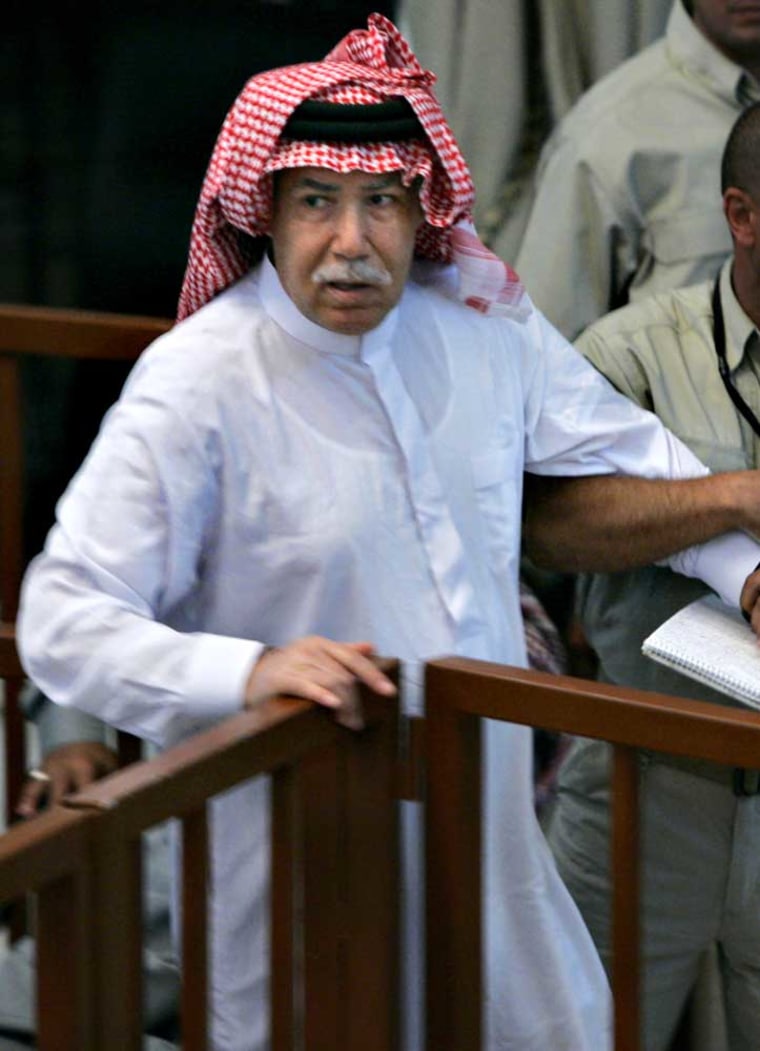The chief judge in Saddam Hussein’s trial said Tuesday’s session would be the last day to hear defense witnesses, suggesting he wants to quickly wrap up the proceedings despite defense complaints about being rushed.
One of Saddam’s top co-defendants, Barzan Ibrahim, was absent after being thrown out of the court the day before for arguing with chief judge Raouf Abdel-Rahman. The judge said Tuesday that Ibrahim was being kept out “for his violations against the order of the court.”
Abdel-Rahman scolded the defense team, telling them to stop what he called “political speeches.”
“This is the last session to hear the testimony of defense witnesses,” he said. “We don’t want speeches ... So chose one — speeches or hearing witnesses.”
If Abdel-Rahman sticks to that stance, it could mean that the end of proceedings is near in the nearly 8-month-old trial. After the defense witnesses are finished, the prosecution and defense would present their closing statements and the five-judge panel would adjourn to consider their verdicts.
Saddam and seven former members of his regime are charged with of crimes against humanity for a crackdown against Shiites in the town of Dujail, which was launched after a 1982 assassination attempt against the then-Iraqi leader. They are accused of illegally arresting hundreds of Shiites — including women and children — torturing some to death and killing 148 people who were sentenced to death in the attack on Saddam.
They could face execution by hanging if convicted.
Former bodyguards testify
The court Tuesday heard a quick series of defense witnesses, including three former bodyguards of Saddam who were with him on the day of the shooting attack on his motorcade in Dujail. The witnesses testified anonymously from behind a curtain to protect them from reprisals.
They said Saddam ordered his guards to stop firing back when gunmen in a nearby palm grove shot at his car. “My understanding at that time the president did not want ... even an animal in the groves to be hurt by the bodyguards’ fire,” one of the witnesses said.
Another of the witnesses said some Dujail residents approached Saddam after the attack “and they were crying to apologize. I remember, he told them, ’They (the attackers) don’t represent you, you are good people.”’
Tensions have grown in the court after the tough-talking Abdel-Rahman effectively shut down a defense attempt to discredit the prosecution’s case. Last month, three witnesses testified that some of the 148 Shiites were still alive and living in Dujail.
The defense argued that, if the claims were true, the prosecution’s portrayal of the crackdown was deeply flawed and that all the documents it presented should be reviewed for accuracy.
Abdel-Rahman, however, had the three witnesses arrested for perjury, along with a fourth witness who claimed that the chief prosecutor tried to bribe him to testify against Saddam.
On Monday, alleged confessions of the four witnesses were read in court, admitting they committed perjury either because they were intimidated by Saddam loyalists or offered rewards by the defense.
The defense team alleged the confessions were forced, and two of the witnesses — who have since been released and fled abroad — told The Associated Press they were beaten in detention to make them sign the confessions.
'This is dictatorial'
Ibrahim, Saddam’s former intelligence chief, was dragged out of the court Monday by guards after he accused Abdel-Rahman of “terrorizing” the defense. When he tried to push off the guards who were grabbing him, they held his left arm and pushed him into a wall as they tried to hustle him out the door, causing an uproar among the defense lawyers.
“This is dictatorial,” Ibrahim shouted. “You know dictatorship,” Abdel-Rahman sneered in reply.
An American lawyer on the defense team, Curtis Doebbler, lashed out at the court, accusing it of mistreating the defense, ignoring its written motions, intimidating its witnesses and rushing it to finish its case.
“We are at a serious disadvantage to the prosecution because of the way we have been treated by the court,” he said. “We want to work for justice. But that must start by having a fair trial. But under the current circumstances, that doesn’t seem possible.”
Doebbler — a visiting professor at Najah University in the West Bank — is one of two American lawyers on the defense team, along with former U.S. attorney general Ramsey Clark.
